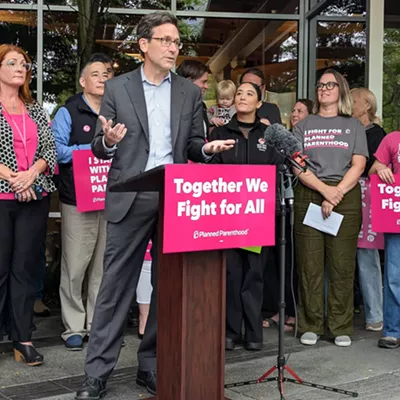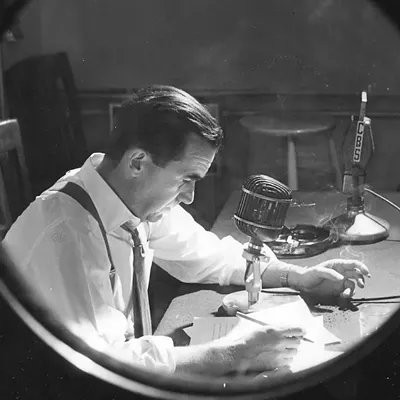Every Christmas, I ask Santa for the same thing: good, community-based, non-commercial radio. And every year, I get skunked. Why Santa? Why? Why can't I have real music alternatives like the good kids in Portland have? When will I have a radio station in my hometown that plays music I want to hear, that represents progressive views, that isn't stifled and corrupted by the grim specter of corporate America? It doesn't seem like too much to ask.
Well this year, I just might get my wish, though I won't be thanking St. Nick. Instead, my eternal gratitude will be directed to local activist Lupito Flores and a small group of volunteers who have seized upon a rare opportunity in an effort to provide Spokane radio listeners with the kind of programming commercial stations have consistently denied them.
Introducing THIN AIR COMMUNITY RADIO FM 95.3, Spokane's first and only non-commercial, non-profit, community-operated radio station. Though the first broadcast is still months away, the station is even now beginning to take form. This Friday beginning at noon, Thin Air's supporters will host an open house at their studio in the Community Building at 35 West Main. Members of the community are invited to check out the broadcasting facilities, learn more about Thin Air Radio and submit programming ideas. Thin Air is your radio station, and you'll have an opportunity to shape its destiny.
To many of you, this must sound like a dream. A community radio station in Spokane? I could hardly believe it myself when I first heard the news. But according to Flores, it's all very real.
"Commercial radio is so stuck in the mainstream and doesn't reflect the perspectives or musical tastes of a lot of people out there," he says. "It's just so homogenized. Only a very few corporations own a huge market share of radio and other media, so we just keep getting the same music and the same corporate-sponsored, government-censored news that you get all over the country. We're looking to do something different."
That "something different" will include news and current affairs programming, local arts and culture coverage and music -- lots of music. Thus far, concepts for music shows dominate the huge wall-mounted piece of butcher paper in Flores' office that serves as a rough programming outline. Scrawled across it in a multitude of different marker colors are show proposals representing every conceivable musical genre.
How did such a beautiful thing happen? After all, elsewhere in America, media outlets are being consolidated into the hands of a few multinational corporations. The current trend is to control information and entertainment, not free them up.
Enter the FCC. In January 2000, the Federal Communications Commission, in an effort to open the airwaves to individuals and groups historically unrepresented or underrepresented on commercial radio, created a new low-power FM radio service (LPFM). Non-profit groups around the country were invited to apply for licenses to create 100-watt LPFM stations in their communities in the hope that such non-commercial, community-based broadcasting would serve as an outlet for alternative voices, views and entertainment.
Flores and his group applied for such a license last May during the State of Washington's application filing window. If all goes according to plan, Thin Air will be granted its license sometime this spring or summer and Spokane will have a fully operational community radio station up and running by this fall. Operating a minimum of 12 hours a day with a minimum of eight hours of locally produced programming, Thin Air's 100-watt transmitter will be just powerful enough to cover most of the Spokane area with varying degrees of reception quality. Downtown and the Valley will probably receive the poorest reception.
Thin Air will be patterned after KBOO in Portland, a volunteer-staffed community station that has been broadcasting alternative music, news and information for the last decade. Flores (who is also the Lewis and Clark Project Coordinator for the Save Our Wild Salmon Coalition) says that the only way for Thin Air to be successful is for members of the community to step up and contribute their time, energy and, if possible, money to the project. So far, the station has more ideas than cash and more volunteers than equipment. Still, Flores is encouraged. The airwaves are public property. And the folks at Thin Air are determined to claim a slice for the people of Spokane.
"The response so far has been really positive," says Flores. "Especially considering we haven't really done any paid advertising yet. It's all just been kind of word of mouth. Right now, we're just taking every suggestion. But eventually we'll develop guidelines that will require people to outline what they'll be doing. We'll want to ask them how their show will further our mission, that is, emphasizing non-corporate, progressive values such as peace, justice, environmentalism and human rights.
"But really," he adds, "if it's a program you can't hear on commercial radio stations, it stands a good chance of making it on ours."
Her press kit identifies acoustic guitar-packing BRENDA WEILER as a folk/rock singer/songwriter. I probably don't have to tell you that that's a pretty densely populated genre these days. So how does an artist in such a competitive field find distinction or, at least, personal satisfaction? Two ways: exceptional songwriting and relentless touring. Spokane audiences will have an opportunity to witness Weiler's capacity for both when she performs at the Shop next Thursday evening.
Originally from Fargo, N.D. (of all places), Weiler is now a well-known face on the Minneapolis acoustic music scene with four albums to her credit (Crazy Happy, Trickle Down, Fly Me Back and the latest, Brenda Weiler Live). Her touring schedule is hectic, but it is within the very context of these intimate and accessible performances that Weiler's power to connect with her audience resides.
"Since the release of Fly Me Back last September," she says, "I've been touring all over the Midwest and East, playing both new and old venues. The acceptance and recognition I received from that album was incredibly positive and reaffirming."
In fact, Fly Me Back was nominated for two Minnesota Music Awards (for Best Folk/Acoustic Recording and Best Indie Album) and was picked as one of Performing Songwriter Magazine's top DIY albums for 2000.
But don't let these words unduly influence you. It's best to let Weiler's honest, intelligent songwriting and spontaneous, immediate approach to performing do the convincing.














